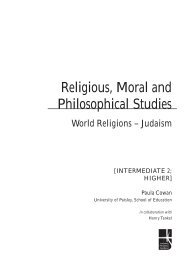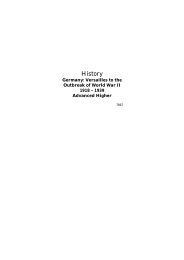Bertolt Brecht - Education Scotland
Bertolt Brecht - Education Scotland
Bertolt Brecht - Education Scotland
Create successful ePaper yourself
Turn your PDF publications into a flip-book with our unique Google optimized e-Paper software.
32<br />
CRITICAL STUDIES<br />
Itzin, C, Stages in the Revolution: political theatre in Britain since 1968,<br />
London: Methuen, 1980<br />
A great read, written less in an academic manner and more with a journalistic<br />
clarity. The theatrical activity of the left in the ten years between 1968 and<br />
1978 is all here, bursting with <strong>Brecht</strong>ian influences.<br />
Jameson, F, <strong>Brecht</strong> and Method, London: Verso, 1998<br />
By one of the foremost writers on postmodernism and culture, Jameson’s<br />
book is a difficult read but one that, while trying to claim parts of <strong>Brecht</strong> for<br />
postmodernism, also recognises his modernist roots. (Jameson prefers the<br />
translation ‘estrangement’, rather than ‘alienation’, for Verfremdung.) Read the<br />
section on The Caucasian Chalk Circle and the positing of a theoretical<br />
reasoning for his use of pre-modernist peasantry set against the modernism of<br />
capitalists.<br />
Jones, David Richard, Great Directors at Work: Stanislavski, <strong>Brecht</strong>, Kazan,<br />
Brook, Berkeley and London: University of California Press, 1976<br />
Includes in-depth description and analysis of Mother Courage model book.<br />
Kaye, N, Postmodernism and Performance, London: Macmillan, 1994<br />
There is absolutely no mention whatsoever of <strong>Bertolt</strong> <strong>Brecht</strong> in this book. As a<br />
study of postmodernist practice, it is concerned with ‘disruption’ of the<br />
spectacle and narrative, and the challenging of hierarchies. All these concerns,<br />
of course, are very <strong>Brecht</strong>ian but due to the postmodernist perspective, room<br />
for a meta-narrative such as Marxism is forbidden. This book will provide<br />
insight into the practice of theatre that many ex-leftwing political theatre<br />
practitioners have moved into. The content and theory may differ, but some of<br />
the techniques and rationales for their use, are remarkably similar. (This book<br />
may also provide some challenging ideas for Unit 1: Devised Drama.)<br />
Kleber, P, and Visser, C (eds.), Re-interpreting <strong>Brecht</strong>: his influence on<br />
contemporary drama and film, Cambridge: Cambridge University Press,<br />
1990<br />
Another series of essays, some better than others.<br />
‘Blocking <strong>Brecht</strong>’ by Maarten Van Dijk is a superb account of the 1983 RSC<br />
production of Mother Courage and the conflict between faithfulness to, and<br />
re-interpretation of, a classic piece of drama.<br />
‘The Origins, Aims and Objectives of the Berliner Ensemble’ by Joachim<br />
Tenschent is eminently readable, short and very much to the point.<br />
Klaus Völker’s ‘Productions of <strong>Brecht</strong>’s plays on the West German Stage, 1945–<br />
1986’ takes a little time to warm up but when it does (as Volker begins to<br />
DRAMA

















